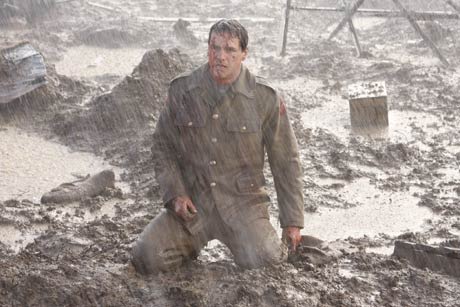Six years after his homage to the eccentricities of Canada and curling (Men With Brooms), Paul Gross aims his pen and lens at a brief and emblematic snapshot of Canadian history World War I.
The third Battle of Ypres is both a cautionary and proud tale. On one end, there is a long list of casualties during Sir Douglas Haigs controversial push for Passchendaele through the mud, the rain and the painful advance of only a few short kilometres bathed in the blood of hundreds of thousands. On the other side is the story of a young soldier, barely tested, courage unshaken, facing the greatest of horrors. But this untried soldier is not Paul Gross, nor any of the actors in this film.
Passchendaele is a love story, true. But while lovers Michael and Sarah (Paul Gross and Caroline Dhavernas, respectively) do pull most of the screen time, with their oh-so-human flaws and subsequently believable amour, the love story that emerges is the one between director and country. This is the story of how a country grew up amongst the mud, rain and blood.
Amongst not-so-subtle thematic touches horses, kestrels and weather shaped to mirror the journey of a man and his country Gross manages to convincingly weave a tale that travels from fresh-faced Alberta to the grim and unending battlefields of France. Yet there is something of a Passchendaele principle that runs through the film. Whether through love, relationships, politics or life itself, there is always a sense of the futile: how the smallest, tiniest steps always take their payment in blood.
This is Canadas ultimate coming-of-age story a youth violated while still remaining steadfast under the onslaught of shells and death. And this, more so than the marketable romance in the film, makes Passchendaele a true love story.
(Alliance)The third Battle of Ypres is both a cautionary and proud tale. On one end, there is a long list of casualties during Sir Douglas Haigs controversial push for Passchendaele through the mud, the rain and the painful advance of only a few short kilometres bathed in the blood of hundreds of thousands. On the other side is the story of a young soldier, barely tested, courage unshaken, facing the greatest of horrors. But this untried soldier is not Paul Gross, nor any of the actors in this film.
Passchendaele is a love story, true. But while lovers Michael and Sarah (Paul Gross and Caroline Dhavernas, respectively) do pull most of the screen time, with their oh-so-human flaws and subsequently believable amour, the love story that emerges is the one between director and country. This is the story of how a country grew up amongst the mud, rain and blood.
Amongst not-so-subtle thematic touches horses, kestrels and weather shaped to mirror the journey of a man and his country Gross manages to convincingly weave a tale that travels from fresh-faced Alberta to the grim and unending battlefields of France. Yet there is something of a Passchendaele principle that runs through the film. Whether through love, relationships, politics or life itself, there is always a sense of the futile: how the smallest, tiniest steps always take their payment in blood.
This is Canadas ultimate coming-of-age story a youth violated while still remaining steadfast under the onslaught of shells and death. And this, more so than the marketable romance in the film, makes Passchendaele a true love story.
